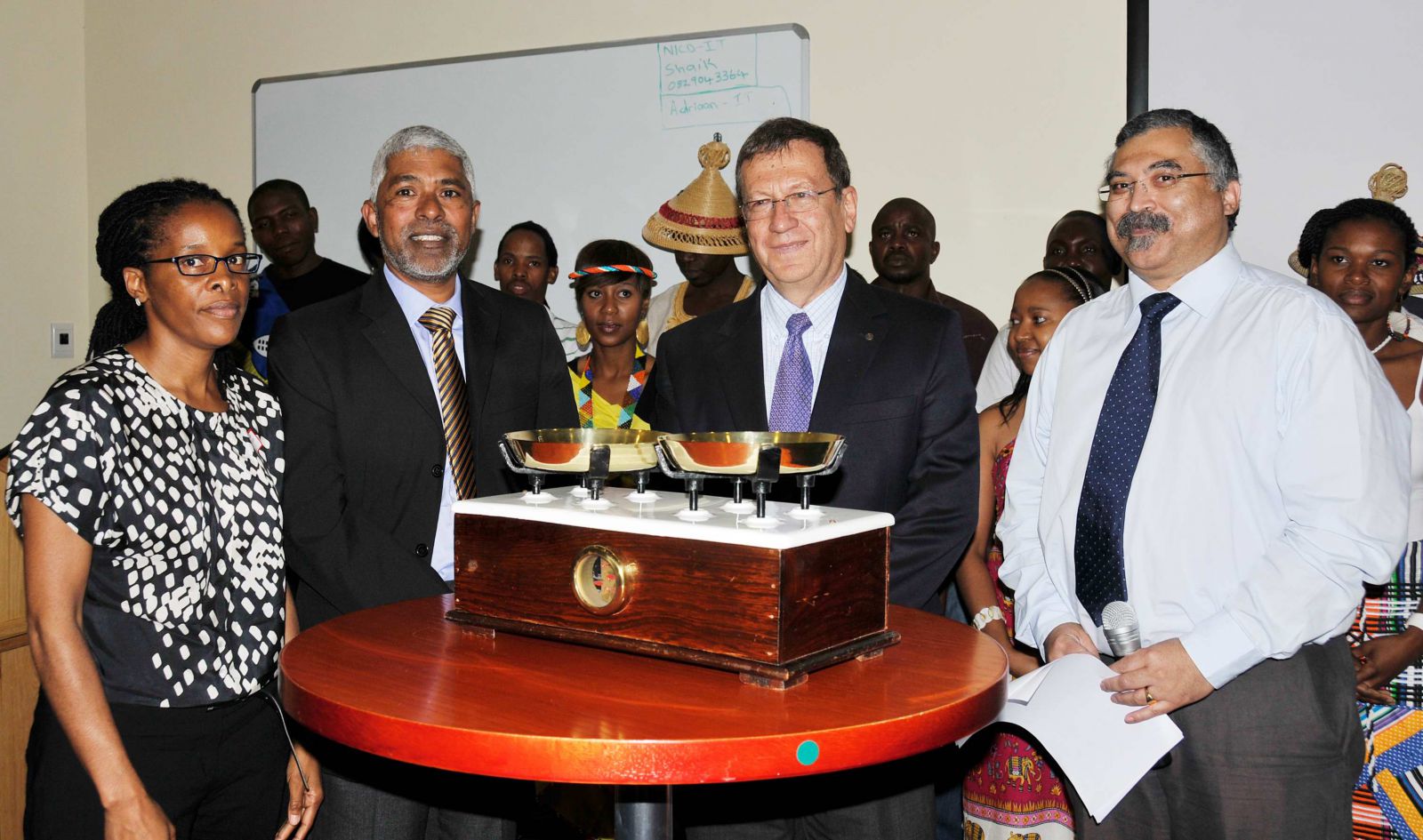
From left: Adv Sesi Baloyi, Mr Sagie Pillay, Prof Barry Schoub and Prof Adrian Puren
Staff and retired staff from the NHLS, representatives from the Department of Health and academic institutions packed the NICD’s PRF auditorium to capacity on the 21st January 2011, to bid farewell and pay homage to NICD executive director Prof Barry Schoub on his retirement, after 35 years’ service.
Tribute was paid by NHLS Chairperson of the Board: Advocate Sesi Baloyi, CEO: Mr Sagie Pillay, head of the AIDS Unit: Prof Lynn Morris, head of the Epidemiology Division: Prof Lucille Blumberg and Prof John Frean, Head of the Microbiology Division.
Adv Baloyi commended Prof Schoub for his consistent support for the NHLS Board. She praised Prof Schoub for his accommodative attitude, excellence and passion for the work done by the NHLS and the public health sector in South Africa.
Prof Schoub was described by Adv Baloyi as someone who understood and embraced the imperatives of the organisation to change and transform. Throughout the uncomfortable changes in the NHLS, Prof Schoub showed exceptional and excellent leadership skills.
“In many respects, Barry Schoub is to public health in South Africa what Pavarotti is to opera”, Sagie Pillay said. He described Prof Schoub as an extraordinary and humble leader who epitomises all the values the public health sector stands for. The CEO pointed out that Prof Schoub’s leadership will leave a huge gap in the organisation. He saluted Prof Schoub for having built a strong service component in the NHLS and NICD.
Reflecting, Prof Lynn Morris attributed a large part of her laboratory’s success and that of the AIDS Unit to Prof Schoub’s leadership and management style. ”Thank you Prof Schoub for your enormous wisdom and guidance,” she concluded.
Prof John Frean thanked Prof Schoub and the then National Institute for Virology for providing a nurturing environment for young researchers and registrars in microbiology, as well as for all the work he had done in making the NICD the organisation that it is today.
“A true visionary who set up many programmes and designed studies to provide scientific-based evidence for policy in public health in South Africa”, said Prof Lucille Blumberg in her tribute. The Epidemiology Division is testament to foundations that Prof Schoub had laid, such as the Influenza Surveillance Programme which has been running for over 25 years.
Prof Schoub then gave a valedictory address titled: ‘On the shoulders of giants – a four-decade odyssey through the world of communicable diseases’. He paid a moving tribute to his father, Dr Israel Schoub, who he said had been instrumental in his life in motivating him and launching him in his own medical career.
Prof Schoub thanked the staff of the NICD and the NHLS, for the support over the years. He said the wonderful work and achievements of the NICD would not have been possible without the staff’s contributions, hard work and dedication.
Prof Barry Schoub: the facts
Barry David Schoub was born in Johannesburg and received his undergraduate MBBCh at the University of the Witwatersrand. He also holds the following postgraduate degrees: MMed, MD, DSc, FRC Path, FC Path, FRSSAf.
He was appointed as the first Professor and Head of the Department of Virology of the University of the Witwatersrand in 1978, joined the National Institute for Virology (NIV) in 1976 and, at the age of 33, in 1982 became the Director of the NIV. In January 2002 Prof Schoub was appointed as the Executive Director of the National Institute for Communicable Diseases.
Long before the establishment of the NICD and NHLS, Prof had a vision for the creation of a centre for disease surveillance and control in southern Africa, similar to the world-renowned Centers for Disease Control and Prevention of the USA. The NHLS transformation process facilitated his dream of such an institute. Under his expert guidance, the NICD has grown in leaps and bounds, and in less than a decade has become one of the most respected healthcare facilities in South Africa.
Prof Schoub is highly respected internationally by his peers and has served on a number of international bodies and as an advisor for several expert WHO bodies including polio, measles, respiratory syncytial virus and influenza. He has also received a number of national and international awards, including the prestigious Paul Harris Award of Rotary International.


